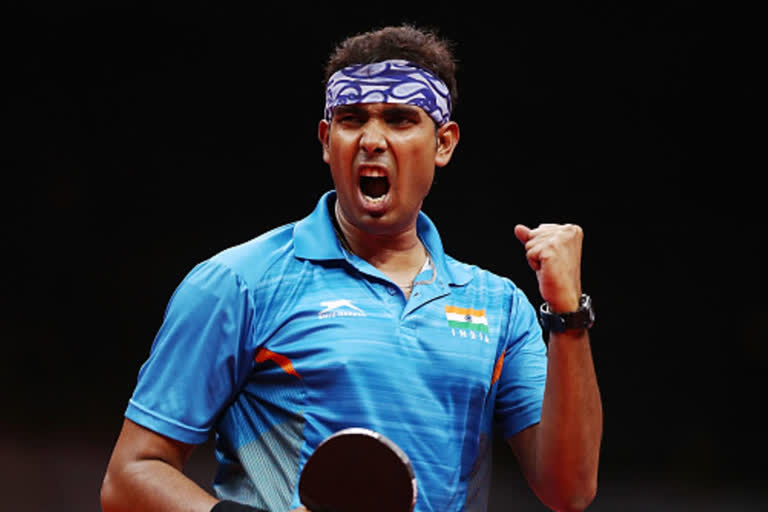Hyderabad: He is following a 12-hour training regime every day at Sonipat national camp. By his own admission, at the Asian Olympic qualifier in Doha, he has hit the top gear. And unfazed by a Covid-19 affected world which cut him off from his familiar moorings, he is making the best of his resources available to him.
Despite a strange start-stop year due to the pandemic, 38-year-old Achanta Sharath Kamal, India's best in Table Tennis, is driven by the hunger of an Olympic medal that has eluded him since he started playing at 16.
And along with Manika Batra, India and Sharath will dream of striking a medal in mixed doubles at the world's biggest stage for sports.
Sharath tells Etv Bharat a "few new serves" he has added into his attack to unleash against the best in Tokyo. While he credits the Table Tennis Federation of India (TTFI) for systematic and structural changes in bringing out the best and tapping the potential of up-and-coming young players, Sharath shares about the medal prospects he has in mixed doubles with Manika Batra at the Tokyo Olympics.
Excerpts:
Q. A welcome change, now that you are in Sonepat? Tell us in what ways has the national camp been helping you?
A. Yes, I was looking forward to coming to Sonipat for the national training camp as we are in a bio-bubble. We are able to completely focus on our sport during these difficult times of Covid-19. I am personally able to spend almost 12 hours of training and fitness with complete focus everyday especially with the same timing as in Japan.
Q. How has been the practice going with Manika Batra? Any particular aspect of the game you guys are focussing on?
A. This time at the national camp for the mixed doubles training, we focused a lot on match play, strategy building and coordination during a match.
Q. You introduced backhand into your game after the injury happened. Are there any other tricks you have been working on keeping in mind the Olympics?
A. Yes, this time I am trying to sharpen the back even further as I had a lot of time to work on it, technically. Apart from that, I have also worked a lot on a few new serves and try to incorporate it into my game.
Q. Your plans to play outside India couldn’t materialise. Setback? Can a national camp compensate for training overseas with players coming from different countries?
A. I was planning to prepare for my singles in Europe but due to Covid situation, India was in the red zone. I couldn't get visa and I had to stay back here during the lockdown and continue my training. The national camp was planned very early and I would have joined the camp even if I had gone to Europe. For my singles preperation, it would have been good but I had to manage with the resources available around me.
Q. The Indian team doesn’t have a head coach for quite some time now. You have been in this game representing India for a long time and you understand what’s good for the team. Is it something that the concerned authorities need to look into more seriously going forward?
A. The head coach is very important. If we had a coach until now, a lot of things would have been in place. But unfortunately, the former coach Massimo Costantini left abruptly without giving us much time to find a new one. When we were trying to find one, Covid had arrived. Hopefully, after the Olympics, we will find a new coach who will help us for a long period of time.
Q. This is the largest Indian Table Tennis contingent going for the Olympics. How come there is an upsurge of multiple players, making it to the highest level?
A. I think the Federation has done a good job since 2016 when we qualified for the Rio Games. There has been a better structure and system around TT players and fraternity. Hence, we had better funding due to which we had a good coach and at the same time UTT (The Ultimate Table Tennis) league had started which gave us the right confidence and platform to play on the international level. The structure was formed in a very balanced way because of which players have been coming up.
Q. What should Indian fans expect from you in the Olympics?
A. Of course, a fair chance to win medal in mixed doubles. We start with Round of 16, and we need three good rounds to win a medal. But these are three difficult rounds also. Once you are there in the big games, and when the pressure is on all of us, I think me and Manika raise our game when put under pressure. That's one of our strong points. I hope we can get one Olympic medal which has been my dream since I started playing for India.
-- By Ayushmaan Pandey



